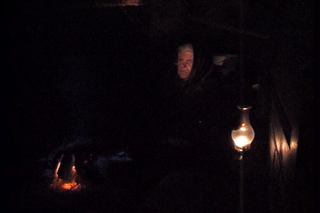CANTAR CANTIGAS / SING SONGS
50' - documentary
was selected for DOCLISBOA 2006
4th Lisbon International Documentary Film Festival, 20-29 October



synopsis
Trás-os-montes, a poor region in the north of Portugal. 2 trips, one on the summer, another on the winter time, searching for people and songs. Bruno, 8 years-old ‘sings with the tapes’. Deolinda ‘walks with the cows’ and show us the village cemetery that ‘has a lot to see’. Ti Ana, with 90 years-old, sing songs by the fire with the neighbors who ask ‘sing another one’. Oral tradition songs, learned from her mother and grand-mother, sang in ‘mirandes’ a local dialect. The songs tell us tragic stories that might remind of Shakespeare.
Trás-os-montes, a poor region in the north of Portugal. 2 trips, one on the summer, another on the winter time, searching for people and songs. Bruno, 8 years-old ‘sings with the tapes’. Deolinda ‘walks with the cows’ and show us the village cemetery that ‘has a lot to see’. Ti Ana, with 90 years-old, sing songs by the fire with the neighbors who ask ‘sing another one’. Oral tradition songs, learned from her mother and grand-mother, sang in ‘mirandes’ a local dialect. The songs tell us tragic stories that might remind of Shakespeare.
You can also check the text TIME OF CHANGES
where I talk about what it means to me to accomplish this film.
Here it is another text I wrote by then, in 1999, in my trip journal, I just found it and I like it. In some way it talks about the general feeling that pushed me to do the film and my understanding of the place and people there.
Land’s weight
Trás-os-montes, October 1999
The Nature is as beautiful as cruel. The land’s weight falls down on men of this cold land. Hard land, land rock, barren land, only food hope, only stream bed of death. The land leaves wet the bones, its smell penetrates in the hands and everywhere it smells potatoes, that cold humid odor that pleases and gnaws. The potato eaters walk around with their bending bodies and tough walk for cause of the weight of the land, the work to take off the bread of the quiet ground. It delays very much until we sight a house threaded in the landscape, constructed with the same rock of the land; dark rock, accustomed to the sacrifice and madness, the violence and the illness, the cry and the death. In this place the joys depend on the land, the frost, the rain in the good time, on the arrival of somebody, someone who has left and comes back to their land, because is their land. The land frees and is jail, poor arrest that compels to want to leave. Men and women leave voluntarily; abandon with homesickness its land courageously, advancing in the ravine for a dog world, complex, but full of faiths and hopes. The ones that are still here are convicted to the direful solitude of sleeping in abandoned villages, to wait, to receive from the land and to die in the land.
